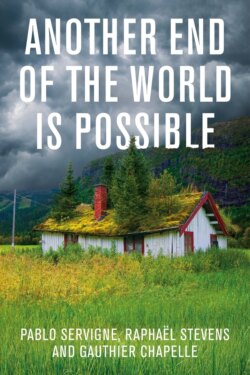Читать книгу Another End of the World is Possible - Pablo Servigne - Страница 8
ОглавлениеForeword
I remember something I once read, though I cannot recall where. We are in Gallo-Roman Provence, towards the end of the fourth century. A patrician, at the head of a vast estate, boasts of the power of Rome. The same archaeological excavations reveal that shortly after its owner wrote about his pride in belonging to the Empire, the villa and its inhabitants were victims of a barbaric incursion. It seems that the assailants feasted on the spot and celebrated their crime by drinking out of the skull of the former master of the estate. Perhaps it is this sinister side of this story that prevents me from remembering where I read it.
Whether that is the case or not, the elites of that time, like those of today, displayed a mixture of arrogance, naivety and crude cynicism. Like today, the end of the Empire saw a dramatic rise in inequality. We can imagine that after centuries of the Pax Romana, it must have been difficult to imagine anything like the end of the Empire. It’s equally difficult for us to admit that after centuries of ‘progress’, thermo-industrial civilization and its high growth rates could fall apart.
If you have opened this book, you have probably had some intuition of such a collapse. So have I, and I am convinced, too, that the moral and political manifestations of our movement towards collapse can already be seen and felt around us. For several years, we have seen the rise of political leaders with much the same psychological profile, who gain power by skilfully stirring up and playing on fear and hatred. Repellent and pretentious, dishonest and depraved, destroying one after the other the barriers, physical as well as moral, that protect his compatriots from global violence, Trump is the epitome of these new ruling elites. Many of these politicians have been elected and have won the admiration of vast numbers of people. As this shows, the catastrophe, and the movement that carries it forward, has a moral nature before it takes physical form. As in Serge Reggiani’s song, the wolves, all too human, were able to enter Paris because they were already there. Human fellow-feeling had already deserted the city.1 Moral violence precedes and feeds physical violence, but above all it blinds us and disarms us in the face of the physical threats which signal our entry into the Anthropocene.
This is precisely why this book by Pablo Servigne, Raphaël Stevens and Gauthier Chapelle is so important. The industrial ‘party’ will soon be over. A number of vital issues, under whatever names, will again take centre stage. How this present world ends, and even more what new worlds it will give birth to, will depend very much on the connections which we are able to weave and on how we succeed in imagining our immediate future. In this respect, this book is very valuable. It is not a treatise of ‘collapsology’, like Pablo and Raphaël’s first book,2 but a book of ‘collapsosophy’. It does not aim to convince us of a probable collapse – an exercise which has already been accomplished – but to prepare us internally to face it, and in a way to go beyond it, by preparing from now on for the world that is to come, the world that we would choose to rebuild, on new principles, among the other worlds that might take shape.
Our approach to reality has driven its extreme love of the one-dimensional, its obstinate simple-mindedness, to the point of destruction. Our Paradise here on earth was to be built purely through progress (but what kind of progress?), science (that of Bayer-Monsanto and its ‘science-based’ approaches?), the quantitative, GDP, growth, competitiveness, efficiency, mastery of the material world (on what scale and for how long?), capitalism, freedom (what kind of freedom? for whom? for what end?), humanity (alone in a lifeless world?). The modern world was to be a world of easilyunderstood slogans, everything simple and straightforward. All we had to do was to keep on growing, without considering the consequences, to tear ourselves away from nature, to focus more and more on the individual, to automate everything, to go always faster and further … towards a world where finally we dread the coming of summer for fear of suffocating, or of being the victim of some extreme event, where seeing a ladybird fly has become a rare occurrence, where cities have become refuges of biodiversity because the countryside has been devastated, where the sciences, those of climate or biodiversity, that still seek to understand the world rather than to oversimplify it even more, describe nightmare futures. And so on.
It’s time to stop. We have spent too long sliding down the slope of this destructive modernity. It’s time to oppose to it our inner world, our emotions and passions, our children, our friends, our networks, our intelligence and our creativity. We can learn again to accept the complexities of reality (or rather of realities). We can learn again that our world is more than just what we can dominate, directly or indirectly, and more even than we can understand. We can restore ourselves with the wisdoms that the world has accumulated through centuries past, without sneering at them, but also without being afraid to create something new. We can bring into being the spirituality, and the spiritualities, that will allow us to remain upright in the coming storm and to rebuild a shared, open house in which we can all live.
Dominique Bourg
Philosopher, University of Lausanne
Notes
1 1. The reference is to Serge Reggiani’s 1967 song, ‘Les loups sont entrés dans Paris’ (‘The wolves have entered Paris’) – Tr.
2 2. Pablo Servigne and Raphaël Stevens, How Everything Can Collapse: A Manual for Our Times (Cambridge: Polity Press, 2020).
